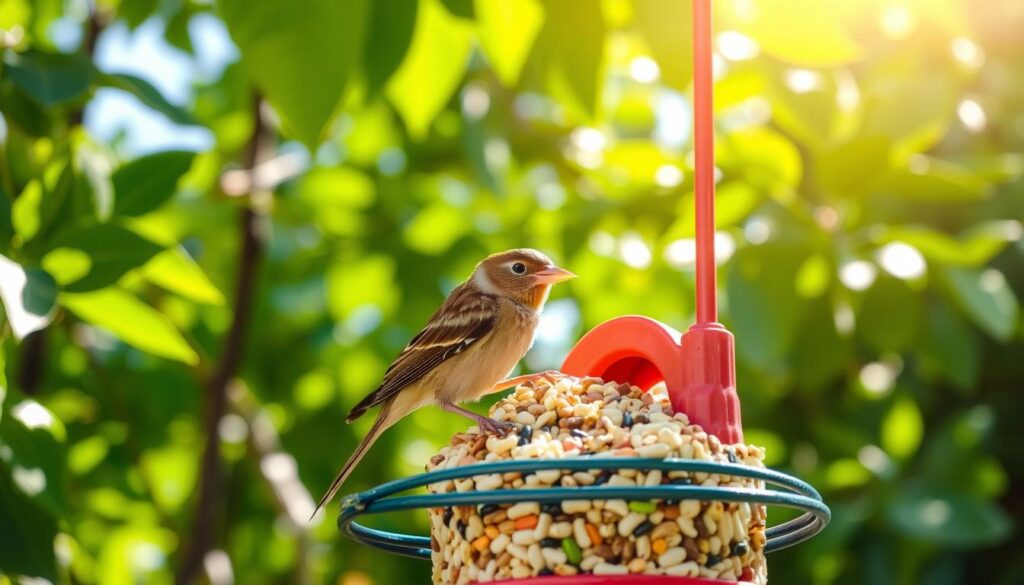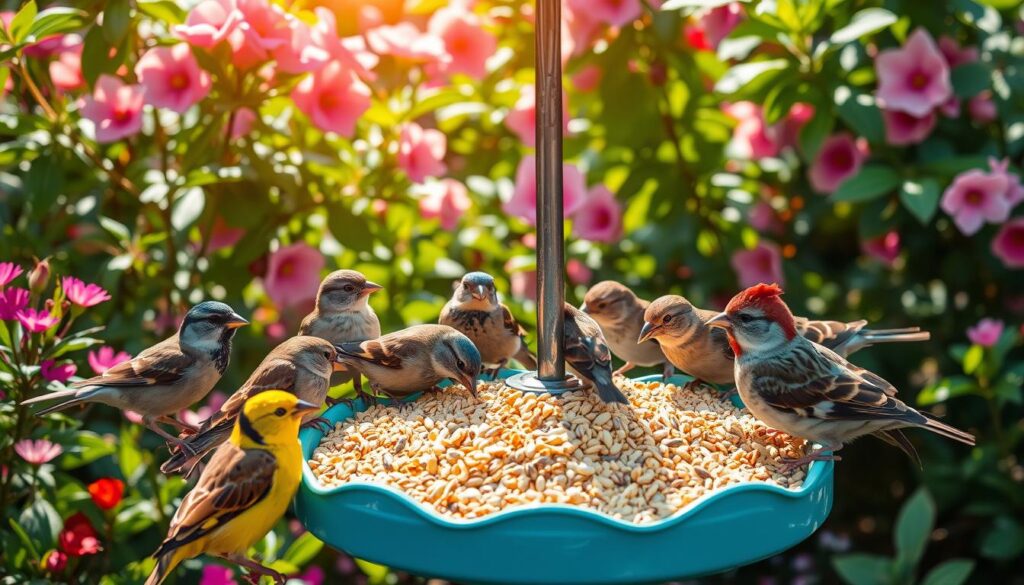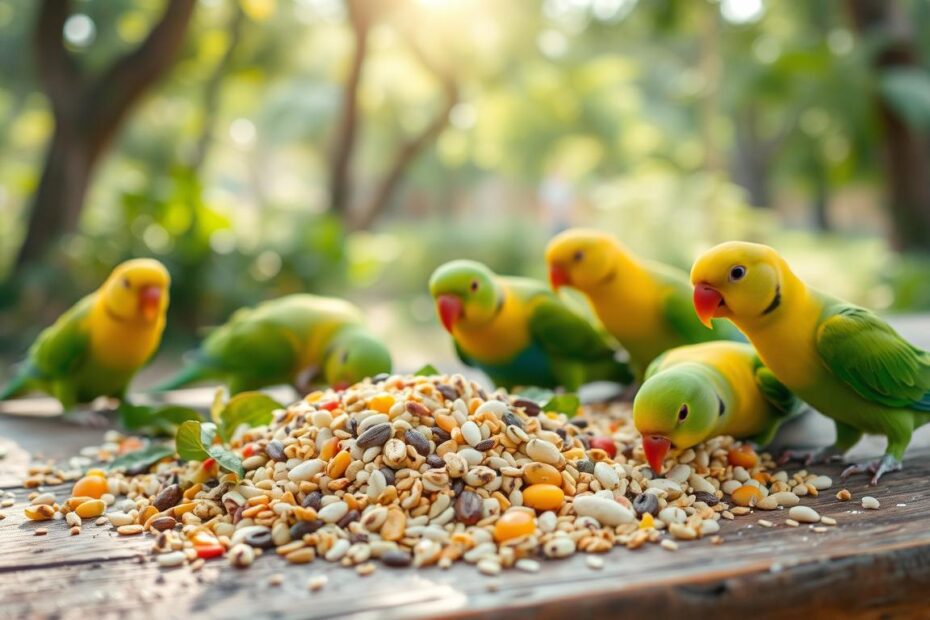Introduction
I love watching birds in my backyard. Their colors and songs are amazing. But, it’s important to know what food is best for them.
Parakeets need a special diet to stay healthy. Sharing their food with wild birds might seem nice, but it’s not always good. We’ll look into if wild birds can eat parakeet food and give tips for feeding both.
Key Takeaways
- Parakeets have specific dietary requirements that differ from those of wild birds.
- Feeding wild bird food to parakeets can lead to nutritional imbalances and potential weight gain.
- It’s important to gradually transition parakeets to a balanced pelleted diet for optimal health.
- Providing appropriate healthy treats and fresh fruits and vegetables is essential for parakeet care.
- Avoiding toxic foods and following proper food handling guidelines is crucial for the safety of parakeets.
Understanding Parakeet Diets
As pet owners, knowing what our parakeets eat is key. These colorful birds love to eat a variety of foods. They do best on a diet that’s similar to what they find in nature.
Parakeets’ Natural Diet
In the wild, parakeets eat a lot of different things. They munch on leaves, fruits, and even insects. This mix of foods helps keep them healthy and happy.
Balanced Nutrition for Pet Parakeets
Our pet parakeets need a special diet. They should eat 75-80% of a nutritionally complete food. The rest should be fresh fruits and veggies. This mix gives them all the nutrients they need to stay healthy.
| Nutrient | Importance for Parakeets |
|---|---|
| Calcium | Essential for strong bones, egg production, and overall health. |
| Vitamins A and D | Vital for immune function, vision, and calcium absorption. |
| Protein | Necessary for growth, feather development, and muscle maintenance. |
| Fiber | Aids in proper digestion and prevents gastrointestinal issues. |
By understanding what our parakeets need to eat, we can help them live long, happy lives. A balanced diet is key to their health and happiness.
The Difference Between Parakeet and Wild Bird Food
Parakeets and wild birds have different diets. Parakeet food meets their special needs. Wild bird food is made for many birds visiting your yard.
Composition of Wild Bird Food
Wild bird food has many seeds, nuts, and other items. It’s high in fat, which helps wild birds fight the cold. But, it can cause weight gain and health problems in parakeets.
| Nutrient | Parakeet Food | Wild Bird Food |
|---|---|---|
| Protein | 12-16% | 8-12% |
| Fat | 3-5% | 10-18% |
| Fiber | 3-5% | 2-4% |
| Calcium | 0.8-1.2% | 0.5-0.8% |
The table highlights parakeet food’s better nutrient balance. It has more protein and calcium than wild bird food.
“While wild bird food is not toxic to parakeets, it is not formulated to meet their specific nutritional requirements.”
Parakeet owners should avoid wild bird food. It can cause nutritional imbalances and health issues in parakeets.
Risks of Feeding Wild Bird Food to Parakeets
Sharing your parakeet’s food with backyard birds might seem kind. But it can harm your pet’s health. Wild bird food lacks the nutrients parakeets need, leading to health problems.
Nutritional Imbalance
Parakeets need a diet different from wild birds. Wild bird food has too much fat and not enough vitamins and proteins. This can cause health issues in parakeets over time.
Potential for Obesity
Wild bird food’s high fat can make parakeets obese. Parakeets gain weight easily because they metabolize food slowly. Obesity can cause breathing and joint problems.
To keep your parakeet healthy, avoid wild bird food. Give them a diet made for parakeets. This prevents nutritional imbalances and obesity, ensuring they stay happy and healthy.
can wild birds eat parakeet food
Wild birds can eat parakeet food without immediate harm. But, it’s not good to feed it to them regularly. Parakeet food is made for pet parakeets and might not be balanced for wild birds.
Feeding parakeet food to wild birds can cause nutritional imbalances and health problems. In extreme weather, extra bird food can help. But, it’s key to give food that matches wild birds’ natural diet.
Sunflower seeds are great for wild birds, attracting many species. Suet cakes are favorites of chickadees, nuthatches, and woodpeckers. But, choose high-quality suet or suet cakes without fillers like oatmeal and millet.
| Food Type | Nutritional Benefits | Considerations |
|---|---|---|
| Sunflower seeds | High-energy food, attract diverse species | Black oil and striped varieties are best |
| Suet cakes | Loved by chickadees, nuthatches, woodpeckers, bug-eaters | Avoid cakes with fillers, offer high-quality suet |
Creating a bird-friendly habitat with native plants is best. It helps feed wild birds naturally. Also, clean bird feeders often to stop viruses and parasites.
In short, while wild birds can eat parakeet food, it’s not good for them. The best way to help wild birds is to give them food that fits their natural diet.

Transitioning to a Pelleted Diet
As parakeet owners, we must give our birds a balanced diet. Many parakeets start with seeds, but a pelleted diet is better for their health. Switching to a pelleted diet can make your parakeet healthier and less likely to get fat.
Benefits of Pelleted Foods
Avian vets say pelleted foods are best for parakeets. They give all the nutrients your bird needs, unlike seeds. This helps avoid health problems like vitamin A deficiency and liver disease.
Gradual Transition Approach
Switching to a pelleted diet needs to be slow. Parakeets like routine, and sudden changes can upset their stomachs. Start by adding a bit of pelleted food to their seeds. Slowly increase the pellets until they only eat pellets.
Be patient and keep trying when transitioning your parakeet to a pelleted diet. With time and the right steps, your bird will live a healthier, happier life.
Healthy Treats for Parakeets
Parakeets need a balanced diet mainly from pellets. But, adding healthy treats in small amounts can make mealtime fun. These treats give your bird important vitamins and minerals.
Millet
Millet is a favorite among parakeets. It’s full of protein, vitamins, and minerals like iron. Give millet as a treat to keep your bird’s natural foraging skills sharp.
Hard-Boiled Eggs
Hard-boiled eggs are a great source of protein for parakeets. Just chop a small piece of egg, shell and all, and mix it into their food. But, remember to only give eggs in small amounts because they are high in fat.
Cooked Corn
Cooked corn is a tasty and healthy option for parakeets. Its sweet taste and crunchy texture are a hit. Just make sure to cook it without oils or seasonings and give it in small amounts.
While these treats are good, they should not replace your bird’s main diet. Always check with your vet to know how much and how often to give these treats.
Fresh Fruits and Vegetables for Parakeets
It’s key to add fresh fruits and veggies to your parakeet’s diet, besides high-quality pellets. These foods are packed with vitamins, minerals, and antioxidants. They help keep your parakeet healthy and happy.
Nutrient-Dense Options
Choose bright, colorful veggies like bell peppers, broccoli, carrots, and sweet potatoes. They’re full of vitamins A, C, and K, and minerals like calcium and iron. They also have fiber to help with digestion.
Portion Control
It’s important to control how much fruit and veggies your parakeet eats. Some, like bananas and grapes, have a lot of sugar. This can cause stomach problems if eaten too much. Give these treats in small amounts and watch how much your parakeet eats.
Adding different parakeet fruits and parakeet vegetables to their diet is good for their health. Just remember to keep an eye on how much they eat to avoid problems.
“Providing a diverse array of fresh produce for your parakeet not only promotes their physical health but also stimulates their natural foraging instincts, keeping them mentally engaged and content.”
Tips for Safe Feeding
Feeding your parakeet safely is very important. Parakeets are delicate, and some foods can be harmful or even deadly. It’s also key to handle food properly to keep your bird healthy.
Avoiding Toxic Foods
Knowing which foods are bad for your parakeet is crucial. Foods like avocado, onions, and garlic can be very dangerous. Always wash fresh fruits and veggies before giving them to your bird to remove harmful chemicals.
Proper Food Handling
Good food handling is essential for safe parakeet feeding. Use clean dishes and change your parakeet’s water every day. This stops bacteria from growing and keeps food and water fresh. Also, store leftover parakeet food in a sealed container to keep it fresh and safe.
By avoiding toxic foods and handling food right, you make mealtime safe and fun for your parakeet. A little care can keep your bird happy and healthy for many years.

Conclusion
While wild birds can eat parakeet food, it’s not good to feed it to them. Parakeets need a special diet that includes pellets, fresh fruits, and veggies. This diet keeps them healthy and happy.
It’s important to know the difference between parakeet and wild bird diets. This way, you can take care of your parakeet and the birds that visit your yard.
Feeding your parakeet the right food is key. Don’t give them wild bird food too often. Too much food can make them lazy and not want to forage for food.
Make sure to offer a variety of healthy foods. Keep the food clean and stored properly. This makes your yard a safe place for both your parakeet and the wild birds.
Knowing what parakeets and wild birds need to eat is crucial. By choosing the right foods, you help your parakeet and the birds in your yard thrive.
